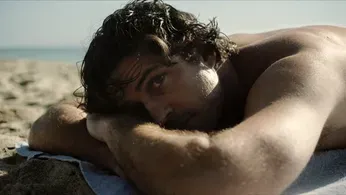
November 18, 2024
Inside 'High Tide' – A Talk with Director Marco Calvani and Star Marco Pigossi
Kilian Melloy READ TIME: 8 MIN.
One queer-themed film likely to turn on 2024's Best Lists is "High Tide," Marco Calvani's drama about an undocumented Brazilian immigrant dumped by his boyfriend on a vacation in Ptown. EDGE spoke with Calvani and star Marco Pigossi.
"It took a village to make this film," director Marco Calvani says. He's talking about the way local artists, merchants, and residents joined in to help make the production of the film a possibility – a communal effort that reflects a sense of community in the famous gay destination that Calvani and Marco Pigossi, the star of the film, talk about at length during our interview.
The movie is titled after the way the dunes behind "Boy Beach" – the nickname for a stretch near Herring Cove beach that's popular with gay men – fill up so that a hike back across the dunes can mean wading through chest-high water. High tide also creates a kind of swimming pool environment, and in summer the sun warms the water to a pleasant temperature. The dunes being the frolicsome place they are, high tide can make them even more magical.
But the reference can also be taken to mean a place that's slightly offset from the town's communal sense of belonging, a sense that Calvani experienced first hand when the filmmaker found himself stranded in Provincetown at the height of the COVID-19 pandemic. "I couldn't go back to Italy," the director, who also wrote the movie, recalls. "My life was here, and yet I had nothing to do anymore. My career suddenly vanished. The past was a blur. The future didn't exist anymore. In that sense, I was very close to Lourenço," the film's protagonist.
In the movie, Lourenço (Pigossi) is an immigrant from Brazil who has come to the United States to be with his American boyfriend, Joe... only for Joe to suddenly, and unceremoniously, dump him in the middle of their P-Town vacation, leaving Lourenço to fend for himself. Sad, puzzled, and hurt – but desperate not to have to go back to Brazil – Lourenço scrambles to scare up work, cleaning and doing odd jobs for Bob (Sean Mahon) until he can secure long-term employment that will provide him a green card. One of Bob's odd jobs is a painting gig at the home of his ex-wife, Miriam (Marisa Tomei); the two can hardly stand to be anywhere near each other, but Miriam, like so many Cape Cod locals, takes a shine to Lourenço.
Another new friend is Scott (Bill Irwin), a lonely, widowered retiree who has a guest house available for long-term occupancy. Two lonely souls, Bill and Lourenço bond over the occasional shared meal.
But Lourenço is still hoping against hope that he and Joe can reconcile, so he's caught unawares when Maurice (James Bland) happens into his life. Maurice is everything Lourenço wants in a boyfriend, but – this being Provincetown – Maurice is only there for a week. Any chance for the two of them to embark on a longer relationship would depend on Lourenço finally let go of the past and embracing his new life, together with all its uncertain and surprising prospects.
The film isn't political, but politics inevitable informs it. "I arrived in Provincetown right after George Floyd was murdered," Calvani recalls, "and so the conversation around racial injustices and systemic racism was really at the center of all of our conversations, including when you were going out on a date. That infiltrated the script, which was already a story about an interracial couple." Another serendipitous factor, Calvani points out, is that "Provincetown is cinematically beautiful."
Read on to find out more about the movie, what went into its creation, and how themes of home and community relevant to immigrants and queer folk alike pervade the story.

Source: LD Entertainment
EDGE: How thrilling was it for you to not just set a movie in Provincetown, but to film it there?
Marco Calvani: It was incredibly exciting and special. I don't think Provincetown has ever seen such a big crew. It was exciting, but also problematic [to film on location there]. The only possible way was to have the town on our side. It sounds hilarious now that we're saying it, but the biggest chunk of the pre-production was to make friends in Provincetown and bring them in and explain what the movie was about and try to understand how they could collaborate. So many people gave us their stores, their homes, their cars. Making a film is a miracle, but in this case a whole town showed up.
We were the first film crew ever to be allowed to shoot in the marshes of Provincetown, which are [part of the Cape Cod] National Seashore. Boy Beach is basically [part of the] National Seashore. In theory, we couldn't even go there and camp and do whatever. We crossed the marshes with all the equipment, with the high tide up to here [chest level] coming back, and it was a whole adventure.
Marco Pigossi: For me, it was such an amazing experience to be there for the first time and understand the sense of community. It's extremely powerful, this feeling of being a majority instead of minority for a little bit, and I think Provincetown brings this. It makes total sense that Lourenço is trying to find himself, and he ends up in Provincetown. You're embraced by nature [in Provincetown] in a way that makes you feel small in a good way, like you're just a small speck of dust in that gigantic, beautiful world. I think that's what Lourenço feels in many moments.
Kilian Melloy serves as EDGE Media Network's Associate Arts Editor and Staff Contributor. His professional memberships include the National Lesbian & Gay Journalists Association, the Boston Online Film Critics Association, The Gay and Lesbian Entertainment Critics Association, and the Boston Theater Critics Association's Elliot Norton Awards Committee.







